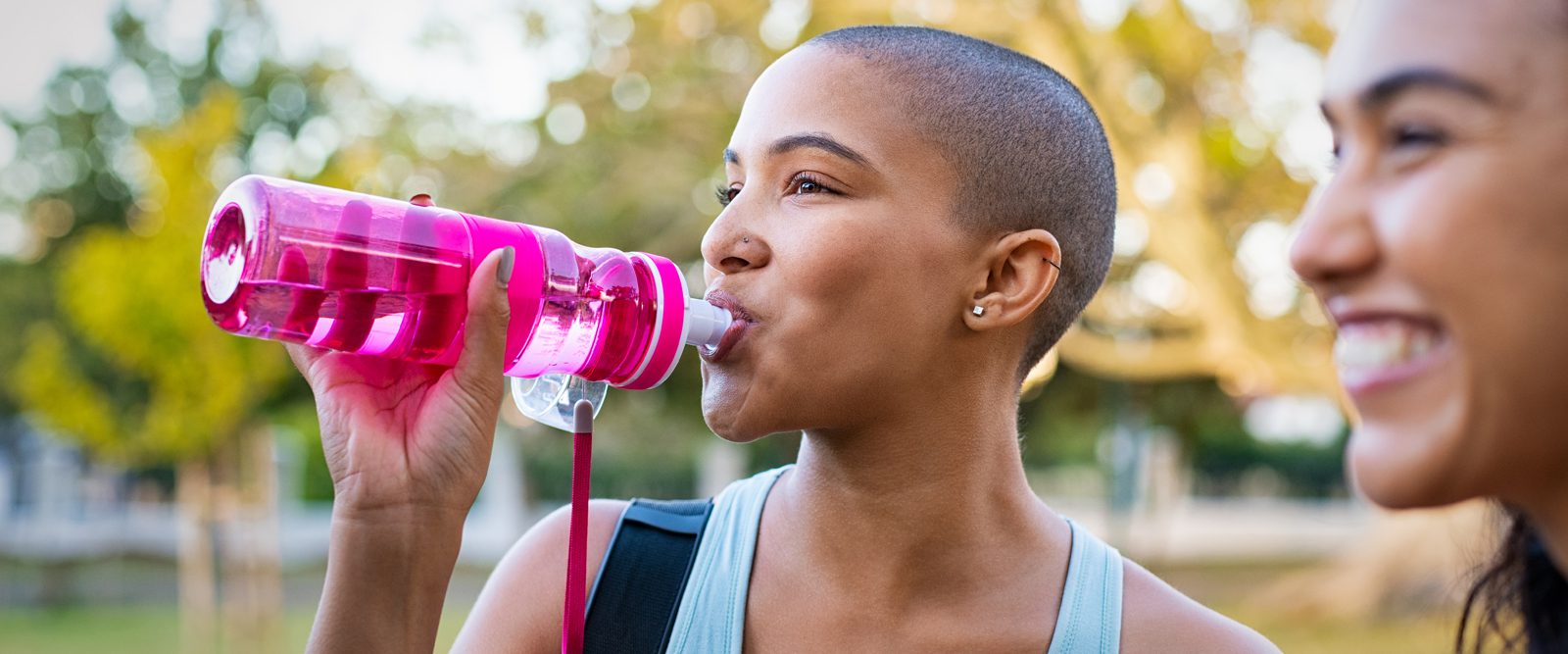How Much Water Should You Drink in a Day?
An expert explains how to determine how much water we need daily, and why it’s important to stay hydrated.

Water is an essential component to our health and many of our body’s functions, including helping regulate body temperature and lubricating joints. Our brain, heart, kidney, and lungs are each composed of about 70% to 80% water.
And yet recent data found that almost half of Americans drink three glasses or fewer of water a day.
So how much water should we be drinking? Is there science behind aiming for eight glasses a day? To help understand the importance of hydration and how to determine the amount of water we should be taking in, Health Matters spoke to Dr. Judy Tung, an internal medicine physician at NewYork-Presbyterian/Weill Cornell Medical Center. She also explains how to spot the signs of dehydration and if liquids other than plain water are as effective at keeping you hydrated.

Dr. Judy Tung
Why is drinking enough water daily important?
I always remind patients that at least 60% of their total body weight is water. Water in the circulatory system helps to maintain your blood pressure, which ensures your brain and other vital organs are adequately perfused with blood. Strong circulation also maintains normal body temperature and flushes bacteria, other pathogens, and toxins out of the body. Hydration is also important for skin elasticity and as a lubricant for the joints. Finally, adequate fluid in the intestines aids in the smooth elimination of stool.
Water is an essential component in helping our body work properly.
How much water should we drink in a day?
The advice of eight glasses a day, which is roughly two liters, is a good benchmark to keep in mind, but it really varies for each individual. There’s also a small difference between women and men due to size differences and energy expenditure. Men probably need closer to three and a half to four liters a day. Women probably need closer to two and a half to three liters of water a day, and if you’re menstruating, pregnant, or lactating, you’ll need to drink more.
How much water you should intake also depends in part on how much you are losing.
We can lose water through our skin when we have a fever, have burns, or are sweating in hot weather. People often forget that you’re also losing from your respiratory system; the air that you breathe out is moisturized. If you’re exercising or breathing fast, you’re exhaling more water.
You can also lose water from your stool, if you have diarrhea or any kind of bowel condition, as well as through your urination. Diuretic medication, used to treat certain heart conditions, as well as beverages that contain caffeine such as coffee, tea, or energy drinks, cause you to urinate more frequently. Under these circumstances, urinating more shouldn’t be mistaken for being adequately hydrated.
What causes people to feel thirsty?
The feeling of thirst is triggered by a hormone from the kidney and the brain that tells the body that it needs more blood volume or that the blood is too concentrated. So, in some ways, thirst tells you to replete what’s being lost. But the sensation of thirst is also highly variable. For example, older people may not get thirsty as often. If you’ve had coffee or alcohol, or are on medications that cause dry mouth, you may feel thirstier. Listen to your body because that’s your first clue that you need more fluid. Try not to suppress the sensation of thirst by chewing gum. Instead, drink water.
If a person is spending a long time outside on a very hot day, how much water should they drink to stay healthy, and how often
Doubling your normal fluid intake is a safe rule of thumb. If your body is adequately hydrated, then you’ll usually urinate about every three to four hours, and the color should be lemon yellow. If you’ve been lying on the beach for six hours and you still don’t feel a need to pee, that’s definitely a sign that your kidneys are trying to hold onto as much water as it can, so you’ll need to drink more water in that situation.
My advice is to keep a water bottle next to you and take sips out of it every half hour or so.
What are signs of dehydration, and when should you seek treatment?
Signs of mild dehydration include dry lips and mouth, sunken eyes, “tented” skin (when you pinch it and it doesn’t flatten back down), thirst, fatigue, headache, and scant urine.
Moderate to severe dehydration can cause dizziness when you change position (sitting to standing), difficulty concentrating or thinking, and no urine. Patients with these symptoms should seek treatment and are usually given IV fluids.
Are there situations in which people should restrict water intake?
It’s rare, but there are patients with mental health disorders who compulsively drink; they can exceed 10 liters a day and end up over-diluting their blood to a dangerous level. We sometimes end up hospitalizing them for something called hyponatremia, which is low salt and excess water.
Patients with congestive heart failure and kidney or liver disease should get tailored advice from their doctor, since they tend to retain fluid and have a hard time managing their fluid circulation and volume.
Alternatively, are there any health conditions which require people to drink more water?
People with kidney stones need to drink water to flush out tiny fragments in their urinary system in order to prevent the buildup of a stone. Pregnant people, and people who are lactating, also need more water than the average person. I tell patients that when they have fever, they should drink an extra half cup of water for each degree above normal – so if they’re running a 102-degree Fahrenheit fever, that’s about two extra glasses.
Are electrolyte drinks more hydrating than plain water? What about other fluids?
A normal diet and a healthy kidney provide the necessary electrolytes and sugar, so it is not normally necessary to choose electrolyte drinks over regular water.
There’s a case for electrolyte drinks if you’re experiencing bad gastrointestinal illness or doing very strenuous exercise – as long as you don’t overdo the sugar, especially if you have diabetes or prediabetes. If you need to replenish some of your electrolytes or your energy levels, something with a little bit of sugar and a little bit of salt may help. But again, in general, if you’re eating a normal diet the kidneys will regulate that on their own.
Drinking plain water is the best way to hydrate, but for people who don’t like the taste or prefer seltzer, low sugar flavorings or a little fizz are great options. For people who love milk, I think it’s fine as long as you don’t have to worry about the fat or carbs in milk. Iced black tea can provide some hydration, but it does contain caffeine so just be aware you may get some diuresis. Because they are diuretics, it’s hard to say whether coffee, tea, or alcohol negate the hydration from the fluid you are consuming; but it’s safe to say that they don’t fully count as one of those eight glasses of water.
